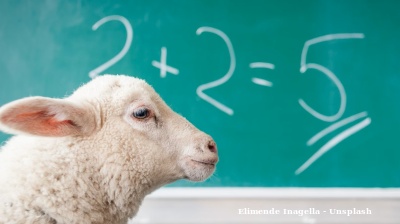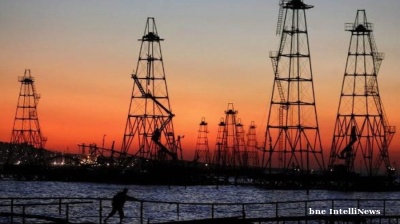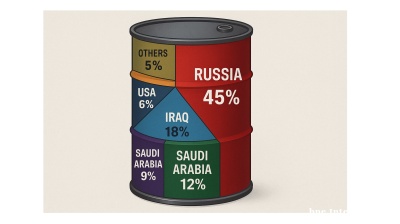Russian crude oil, once a niche component of India’s energy mix, has transitioned into a cornerstone of its import basket since around the time when Russia launched its full scale invasion of Ukraine in 2022.
According to a report by The Hindu, Moscow accounted for 35–40% of India’s total crude imports at the end of July 2025. While under the Biden administration Washington was relatively complicit in enabling India’s consumption of Russian crude especially since it partially alleviated pressure on Washington’s European allies who were forced to end their own purchases from Moscow directly and were instead forced to source from other sources including India and Azerbaijan.
However, under President Donald Trump’s second term his administration has taken a much more hawkish stance that Indian purchases enable Russia to weather sanctions and indirectly fund its war effort, citing this as a direct threat to efforts by the West to isolate Moscow.
President Trump’s Deputy Chief of Staff Stephen Miller has repeatedly declared Russian oil imports a point of irritation in bilateral relations, calling out India as a spoiler in the campaign to restrict the Kremlin’s revenue streams. Faced with public warnings and the imposition of broad 25% tariffs alongside the threat of even more punitive rates on Indian exports, New Delhi has been pressed hard by the US to stop its lucrative oil trade with Russia.
Trump’s rhetoric on this issue has been relentless; Western officials have signaled the possibility of secondary sanctions targeting both Indian refiners and intermediary financial institutions that have supported settlement of payments between Moscow and New Delhi.
Despite this pressure, Indian authorities have doubled down on their long-standing position, that India must choose its suppliers based on cost, availability, and commercial logic, not external political demands. Prime Minister Narendra Modi, several cabinet ministers and several Indian ambassadors including Petroleum Minister Hardeep Singh Puri have gone on record that affordable energy is not only an economic imperative but a social necessity, vital for the country’s 1.5bn population’s sustenance and a cornerstone for fighting poverty and inflation for India’s developing society.
India’s oil refiners, both public and private, are unlikely to receive any publicly acknowledged government orders to cease imports from Russia. Instead, procurement is likely to remain determined by market pricing and logistical considerations, with major energy companies like Indian Oil Corporation (IOC), Reliance, and Nayara playing key roles in negotiating supply contracts the same as before. However, some rerouting via other Organization of the Petroleum Exporting Countries (OPEC) countries such as the United Arab Emirates(UAE) is a possibility - especially since the UAE has previously absorbed a major chunk of the bilateral payments settlement and transactional banking market between India and Russia between 2022 and 2025.
Playing spoilsport in this arrangement might be President Trump’s tendency to seek straight-forward solutions to complex problems of international intrigue. Both the UAE and India are now on the proverbial chopping block of secondary sanctions and increasingly high tariff imposition, if Trump’s rhetoric is to be taken at face value.
India’s openness about its Russian oil purchases is underscored by another key development, while deflecting criticism from Washington, New Delhi has been quietly but steadily boosting its intake of US crude. Figures cited in a report by news agency ANI, show a 51% surge in Indian imports of American oil during the first half of 2025 alone.
This strategic diversification is clearly aimed at blunting some of the diplomatic fallout, reflecting a preemptive and nuanced attempt to convey to the US that India is neither reliant on any single country nor unresponsive to the broader spirit of alliance and partnership with Washington.
However, these gestures have largely been missed or disregarded by the bolstering rhetoric of the Trump administration which relies more on noise than substance due to its populist sensibilities and support base. India’s own narrative response has been limited to rehashing long term strategic narratives such as the mantra of increasing self-reliance such as the “Make in India” initiative under which New Delhi seeks to manufacture more and more domestically and import as little as possible - however since India lacks substantive fossil fuel reserves to fulfill its consumption demand the narrative is not a practical solution.
At least in the short term, the Indian government ties the defense of domestic refinery margins and energy affordability to national security and economic resilience, and has broadened diplomatic engagement to win understanding from other oil producers in the Gulf and West Asia.
The diplomatic calculus underpinning New Delhi’s choices is complex. Indian policymakers point to the country’s historic non-alignment and its more recent evolution into the “multi-alignment” doctrine, arguing that cooperation with Russia is not a betrayal of US partnership, but a natural expression of strategic autonomy.
This position is echoed across the political spectrum in New Delhi, with Indian opposition parties joining government voices in defending the right to buy Russian oil on commercial terms, just as India did with Iranian crude in previous years before US secondary sanctions forced a change in direction. The sharpest domestic political flashpoint for India however, has come from Donald Trump’s repeated and highly public claims that he personally mediated the most recent India-Pakistan ceasefire, a narrative embraced in Islamabad and echoed several times by the US president.
The largest opposition party in India - the Indian National Congress(INC) has criticised the ambiguous approach the government has maintained about Indian Air Force’s fighter aircraft losses during the initial volley of Operation Sindoor which targeted terrorist installations in Pakistan on May 7 2025, which the ruling Bharitya Janta Party(BJP) of Prime Minister Modi has equated with the INC perpetuating damaging foreign narratives against Indian national interests.
The opposition has also aimed criticism at the supposed fallout from Trump’s 25% tariffs and more anticipated penalties on Indian exports and Russian oil purchases - specifically blaming Prime Minister Modi’s alleged performative diplomatic style which according to the INC trades substantive diplomacy for displays of warmth with world leaders.
Features

Is AI making us less intelligent? The debate over declining cognitive skills in the age of ChatGPT and smartphones
Anecdotal evidence from educators paints a troubling picture. Teenagers across the world struggle to properly complete tasks in school, particularly those involving writing.

BEYOND THE BOSPORUS: Arm of state bags itself a crypto exchange
Following claims of money laundering, Icrypex becomes the latest of hundreds of companies to be seized by Turkish regime’s TMSF.

Kazakhstan reviews its big oil contracts looking for a better deal
COMMENT: Kazakhstan is reviewing its big oil contracts Kazakhstan has begun laying the groundwork for a revision of the contracts it signed with big oil in the 1990s when the country was flat on its back.

Can India dump Russian oil imports completely if Trump’s secondary sanctions appear?
Since early 2024 India has typically bought 1.5–2.0 mbpd of Russian crude, or about 35–40% of its total imports. US President Donald Trump is threatening crushing 100% tariffs on Russia’s business partners if they continue to import crude.




